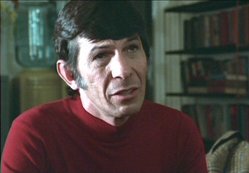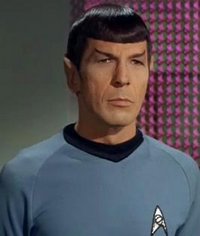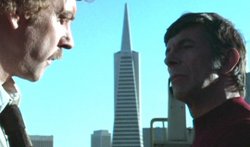Leonard Nimoy
Leonard Simon Nimoy (born March 26, 1931) is an American actor, film director, poet and photographer best known for playing the character Spock in the Star Trek television and movie series. more...
Life
Born in Boston, Massachusetts to Ukrainian-Jewish immigrants, Nimoy spent much of his early career in the 1950s doing small parts in B-movies and in TV shows such as Dragnet.
Nimoy served in the U.S. Army Reserve, receiving final discharge in November, 1955 as a Sergeant. According to the National Archives and Records Administration, Nimoy's U.S. Army service record was destroyed in the 1973 National Archives Fire.
Nimoy has long been active in the Jewish community, and is an adherent of Reform Judaism. One of his better-known roles was that of Tevye the milkman, in the musical Fiddler on the Roof, based on the series of short stories by Yiddish author Sholom Aleichem. In 1997 he narrated the documentary A Life Apart: Hasidism in America, about the various sects of Hasidic Orthodox Jews. In October 2002 Nimoy published Shekhina, a photographic study of women intended to visualize the feminine aspect of God's presence, inspired by Kabbalah (esoteric Jewish mysticism.)
Career
Stage and screen
Nimoy's most famous role is the half-Vulcan, half-human Mr. Spock from the original Star Trek television series (1966-69). He earned three Emmy nominations for playing this character.
In a strange twist of fate, Nimoy and William Shatner (who would go on to play Spock's commanding officer, Captain James T. Kirk), found themselves on the opposite side of the Iron Curtain in the 1964 episode of The Man from U.N.C.L.E., "The Project Strigas Affair". With his saturnine looks, Nimoy was predictably the villain, with the slightly sleazy Shatner playing a reluctant U.N.C.L.E. recruit. Nimoy went on to reprise Spock's character in a voice-over role in Star Trek: The Animated Series, in two episodes of Star Trek: The Next Generation, and in six Star Trek motion pictures featuring the original cast.
Following the cancellation of the original Trek, Nimoy played a spy called Paris in the hit television series Mission Impossible from 1969-71. Although Nimoy said he enjoyed working with Peter Graves and other cast members, he regarded Mission Impossible as one of the low points of his career. He considered the work boring and unchallenging. He has often said there are times he barely remembers doing the show. It was during the run of the show that Nimoy fell deathly ill with a stomach ulcer. Only expert medical attention saved his life.
He co-starred with Yul Brynner and Richard Crenna in the Western movie Catlow (1971). Nimoy also appeared in various made for television films in this period such as Assault On The Wayne (1970), Baffled (1972), The Alpha Caper (1973), The Missing Are Deadly (1974), Seizure: The Story Of Kathy Morris (1980), Marco Polo (1982) and he received an Emmy award nomination for best supporting actor for the TV film A Woman Called Golda (1982). In the late 1970s he hosted and narrated the television series In Search of..., which investigated paranormal or unexplained events or subjects. He also has a memorable part as a new-age psychologist in Philip Kaufman's remake of Invasion of the Body Snatchers. It was during this time that Nimoy won acclaim for a series of stage roles as well. He has appeared in such plays as Oliver!, The King And I, The Man in the Glass Booth, Caligula, and Sherlock Holmes. When a new TV series of Star Trek was planned in the late 1970s Nimoy refused to be involved but when it was elevated to a feature film, he agreed to reprise his most famous role.
After directing a few television show episodes, Nimoy broke into film directing in 1984 with the successful third installment of the Star Trek film series (Star Trek III: The Search for Spock). Nimoy would go on to direct Star Trek IV: The Voyage Home (1986) and move beyond the Trek universe with Three Men and a Baby in 1987. Nimoy also did occasional work as a voice actor in animated feature films including the character of Galvatron in Transformers: The Movie in 1986 and The Pagemaster in 1994.
Literary works
Nimoy has written two autobiographies, the first one called I Am Not Spock (1977). The title of this book was controversial, as many fans incorrectly assumed that Nimoy was distancing himself from the Spock character; however, Nimoy's stated intention was merely to remind the public at large that Spock and Nimoy were not one and the same.
His second autobiography was entitled I Am Spock (1995), and this title was meant to communicate that he finally realized that his years of portraying the Spock character had led to a much greater identification between the fictional character and the real person. Over the years, Nimoy had much input into how Spock would act in certain situations, and, conversely, Nimoy's contemplation of how Spock acted gave him cause to think about things in a way that he never would have thought if he had not portrayed this character. As such, in this autobiography Nimoy maintains that in some meaningful sense, he really is now Spock, and Spock is him, while at the same time maintaining the distance between fact and fiction.
Nimoy has also written several volumes of poetry, some published along with a number of his photographs. His latest effort is entitled A Lifetime of Love: Poems on the Passages of Life (2002).
Music career
During and following the Star Trek years, Nimoy also released several albums of vocal recordings on Dot Records, including Trek-related songs and cover versions of popular tunes. These recordings are generally regarded as unintentionally camp, though his tongue-in-cheek performance of "The Ballad of Bilbo Baggins" received a fair amount of airplay when Peter Jackson's Lord of the Rings films were released.
Read more at Wikipedia.org




